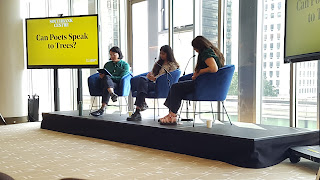I have been writing. Oh yes, I have! While waiting for feedback on my Christmas themed novella, I went back to something I started at least a year ago. It will be part of a trilogy, and this is the last part. I'm about half way through now and these three stories are my first foot into a bit of horror. Getting back into it was a struggle at first, but I'm making headway now, though as usual I have no idea about the ending.
Some weeks back, I went to an event at the Southbank Centre entitled Can Poets Speak to Trees? The event was hosted by Nina Mingya Powles, a writer and zinemaker from Aotearoa in New Zealand. Unfortunately one poet, Elizabeth Jane-Burnett (author of Twelve Words for Moss) was unable to attend, due to the train strike, but another poet came (sorry I forget the name) whose views were very close to mine on the state of the planet. The other poet was Pratyusha, author of Second Memory. The poets began by reading from their books before going on to discuss their poetry and the many aspects of it. These included which season were they most driven to write, how their poetry relates to the planet and trees, and if indeed we can speak to trees. I think the upshot was that we don't really understand the language of trees, though we know a fair amount about their relationship with fungi and the wood wide web. We know they sense things, like invasion, from insects, and can pass this information on to other trees (much like plants do).
It was a fascinating talk. The floor was then thrown open to the audience to ask questions. One question was: do you have hope for the future? One answer was yes, but not for us. The earth will survive very well without us. And that has always been my view. We need the planet more than the planet needs us!
I found the session very inspiring and already I could feel 'tree poems' bursting in my head. In the past I have written a succession of tree poems, which was why this talk interested me so much. I now have very rough drafts of another four poems to work on.
After the talk, I decided to re-join The Poetry Library. I was a member years ago, and in fact still have my original orange card. It fascinated the lady on the desk as she'd never seen one before. The Poetry Library has thousands of books, as well as study rooms and shelf displays of poetry magazines. At first it was a little overwhelming to know where to start, but I borrowed a couple by well known poets to get me started. You can borrow up to four books for four weeks. They also run events throughout the year with visiting poets and discussions.
Book Reviews
The first book, The Gift of Stones is a reminder of those times and is about a community of stone tool makers, knappers. The main character lost an arm as a child when he was shot with an arrow by one of the traders. The arm had to be amputated. The boy had never had the gift of stones that the others had, and was a bit of a dreamer. As he grew, the community thought him useless as a worker. One day on his wanders, he came across a woman and child living on their own. The father had gone to trade with his two sons and had never come back. The character begins to tell stories about his adventures to the community. He becomes their storyteller. One day after a raid he brings the woman and child back and for a while they live with his uncle, until the woman builds her own house. The story is told through the eyes of the woman's child. From my reading other books, I'm guessing this story is set in Neolithic times, just as the end of of the stone age, where it begins to overlap with the bronze age, as towards the end of the book the community come into contact with metal arrows. It is the main character who leads them out of their quarry when they realise that trading flint is no longer viable as metal takes over. This was a very different kind of book, by an author I'd not known before. An interesting read.
Ancestors: The Prehistory of Britain in Seven Burials by Professor Alice Roberts, looks at the remains of burials from stone age through to pre-Roman times. She talks about who first discovered the remains (interested clergy and Pitt Rivers are mentioned), their attitudes to sexuality (males must have been the warriors), grave goods, religion and death. It was a fascinating read. Professor Alice Roberts has, of course, appeared in many TV programmes on the subject of pre-history. She talked about how we must not have preconceived ideas about what we find; about how technology has advanced so much from those early days with the regular using of Carbon 14 dating, and more recent advances that will tell us even more.
The final book I want to mention is Nightwalking by John Lewis-Stempel. Split into the four seasons, the author walks the fields with his dog catching glimpses of wildlife we would probably not otherwise see. He walks in rain and snow, and the heat of a summer's evening. Nothing stops him. There are also diary notes from each season and a glossary at the back of the book. The prose is beautifully poetic as the author describes his surroundings and the animals he sees. You feel you are with him. I also love the front cover! This is a keeper.




No comments:
Post a Comment